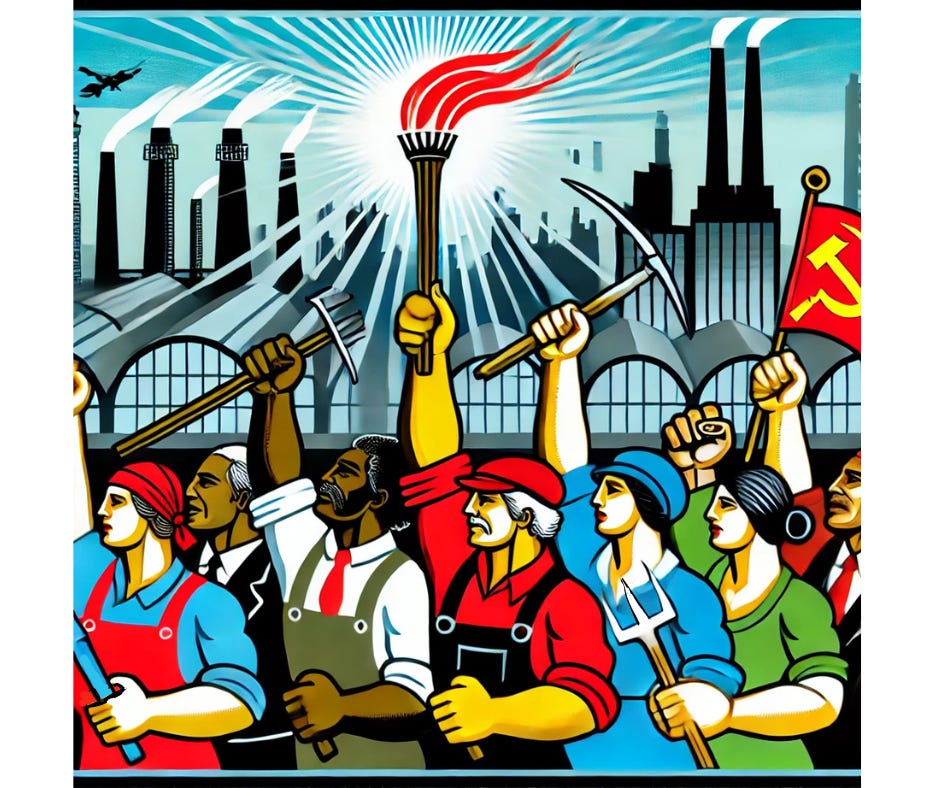
Marx, Engels, and Lenin did not explicitly discuss “identity politics” or “intersectionality” as they are understood in contemporary discourse. However, their writings provide a framework for understanding and integrating these concepts into the broader context of class struggle. For Marx and Engels, historical materialism—the idea that material conditions and class relations provide the context and conditions that drive historical change—was central. They identified the proletariat as the universal agent of revolution, capable of uniting all oppressed groups in the fight against capitalism. This emphasis on class did not ignore other forms of oppression. Engels, in The Origin of the Family, Private Property, and the State, linked the subjugation of women to the emergence of private property and economic structures. Marx’s writings on colonialism and imperialism, including his analysis in Capital (chapter 33), demonstrated his awareness of how economic exploitation intersected with national and racial oppression. Nonetheless, Marx and Engels prioritized class struggle as the foundation of societal transformation, viewing other forms of oppression as secondary to the capitalist system’s overarching framework. They would likely critique identity politics, if detached from class struggle, for risking fragmentation of the unity necessary to challenge capitalism.
Lenin advanced these ideas by addressing national and racial oppression more explicitly, particularly in the context of imperialism. In works such as The Right of Nations to Self-Determination, his polemic against Rosa Luxemburg precisely on the issue of oppression and exploitation, could easily be adopted to be an argument for intersectionality and to some degree against identity politics. If we look at Imperialism, the Highest Stage of Capitalism, Lenin underscored the importance of recognizing intersecting oppressions tied to empire and colonial domination. He supported the self-determination of oppressed nations, acknowledging that class struggle must encompass these specific forms of exploitation. However, Lenin maintained that such struggles needed to be integrated into a broader revolutionary framework to avoid being co-opted by bourgeois interests, which appears to be the case in many western rights-based organizations, and political discourse.
From a Marxist-Leninist perspective, intersectionality—the examination of how various axes of oppression interact—can serve as a valuable tool, provided it is aligned with the goals of revolutionary praxis. Lenin would have likely embraced the concept to illustrate how different groups experience class oppression uniquely while cautioning against allowing it to overshadow the centrality of class in systemic transformation.
A Marxist critique of identity politics, however, would likely focus on its potential to fragment collective action or redirect efforts toward reforms that do not fundamentally challenge capitalist structures. At the same time, an intersectional analysis that deepens the understanding of exploitation and builds solidarity across diverse groups aligns with Marxist aims. For Marx, Engels, and Lenin, identity politics risks bourgeois co-option when it isolates grievances from the broader framework of class exploitation. Conversely, intersectionality becomes revolutionary when it illuminates how various oppressions reinforce capitalist systems and mobilizes these insights to unify struggles under the proletarian movement. In practical terms, a Marxist approach would incorporate intersectional analysis to address specific oppressions while retaining the focus on class as the foundation of societal change. This synthesis would ensure that the revolutionary movement remains both inclusive and effective in challenging capitalism’s multifaceted systems of domination.
